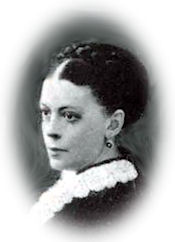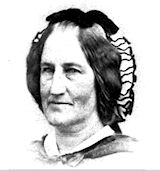Sarah Woolsey to Eliza Woolsey Howland
New Haven, Tuesday Night.
I am just home from a very hot day at the New Haven Hospital, and so glad to find Jane’s note with the news of your arrival that I must write a line before going to bed to tell you of it. And thus our week of suspense ends, and while so many thousands are straining eyes and hearts towards the bloody Peninsula, we may draw a long breath and refresh our thoughts with a picture of our dear Joe safe and resting his “honorable scars” amid friends and comfort and home and peace. . . . Do you know that one of our hospital cases here, on seeing your carte de visite the other day, recognized you as the “lady who gave him some very nice wine as he lay on a stretcher at White House, and bowls full of bread and milk afterward “—upon which he quite took on over it. He is one of the “Ten thousand soldier hearts in Northern climes,”
. . . Dr. Frank Bacon is here, having come up on a twenty-day furlough to recruit himself. I have not seen him but hear that he looks wretchedly—utterly broken down by overwork.
The James Island fight occurred early in June, ’62, and in the official report of the general commanding, F. B.’s regiment is singled out for mention: ” The 7th Connecticut moved up in a beautiful and sustained line.” “The 7th Connecticut had been on very severe fatigue duty for three days and three nights.” “The 7th Connecticut advanced in the open field under continued shower of grape and canister.” “The medical officers were unwearied on the battlefield and in the hospital.”
After this service F. B. went home on sick leave. Later he resigned from the 7th Connecticut, passed the examination for the Corps of Surgeons of Volunteers, and was assigned to duty in charge of the Harper’s Ferry Hospital.
Here he found a large accumulation of army supplies and a hospital in what he considered an exposed position. On reporting this to Washington and recommending its breaking up, he received prompt orders to carry out his own views, and had the satisfaction of getting the patients and supplies safely off on the last train, before a rebel dash captured the place. He writes to J. S. W. that if he had continued the hospital at Harper’s Ferry he should have wanted a select party of ministering angels, and asks whether we write M.A. after our names now, ” after the manner of a mature female in the Harper’s Ferry laundry, who sent up a requisition with ‘D. R.’ after her signature, and on a demand for explanation said daughter of the regiment, sir, which I have been adopted by the 109th.’ ”
F. B. was then assigned to duty in Washington on General Casey’s staff, to examine outlying camp hospitals and break them up when expedient, and to overhaul new regiments and their doctors as they came in. Here, a little later, having got permission to join the troops at the front, he had the miserable experience of marching in from the second battle of Bull Run with the Army of the Potomac, defeated again on their old first field.






